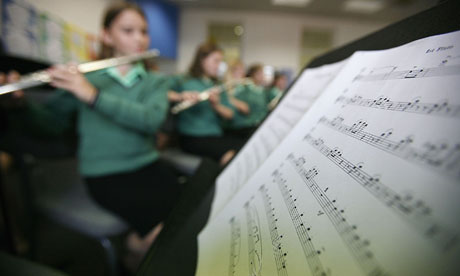
Music is a subject where, a bit like maths, pupils may have often decided that they can't do it before they even try. However, there are several strands within music where one can have a particular talent: performing, composing or listening. A pupil may have been told they "can't sing" at a young age and been put off music completely. However, a talent for composing may be lying there undiscovered.
Some years ago I had a boy arrive in year 7 who could not read a note of music, but play a note on the piano and he could tell you what it was, Sam had perfect pitch. I soon discovered that his ability to improvise at the keyboard and play drums was a talent usually held by someone beyond his years. Through giving him opportunities to perform at school and giving access to the recording studio, Sam soon became a regular face in the music department. He is now in year 13 excelling in music technology A-level. So much of catering for musically talented pupils is discovering specifically where the talent lies and then providing opportunities to develop it.
Assumptions can often be made about musically talented pupils. If we know that a year 7 pupil already has grade seven piano, we may expect a certain level of knowledge and ability that they do not necessarily possess. I am sure that I was guilty of this as an NQT, taking for granted that a strong AS class (all wanting to study music at university) were far more proficient in harmony and orchestration than was actually the case. Filling these gaps is essential if a talented pupil is to progress further. Therefore, meeting pupils where they are at is incredibly important, but also a challenge: as a teacher one has a number of classes, extra-curricular activities and many other responsibilities in the school setting.
My specialist area, within music, is composition. It is the most creative part of the subject, and can be both loved and hated by music teachers and pupils alike. It is not something which is covered in any depth in teacher training and so I have collected ideas and projects like a magpie over the past eight years. What I love about teaching composition is that an approach with two classes is never quite the same. Differentiation is key, and spotting a gifted composer in a classroom setting is important from the outset. Setting tasks with a small amount of prescription but that are ultimately open-ended, gives those pupils with a flair for composing the chance to explore their ideas, while still allowing others to create something satisfying. For example, I am currently teaching melody writing in year 10 with a view to producing a classical piano piece. Within the group though, there are several instrumentalists to whom I have already advised to write a piece for their instrument – play to their strengths. Although this means that I will have half a class doing one thing and half doing another, the knowledge of their own instrument will bring an extra incentive to the project. These pupils will have specialist knowledge of their instrument and will be able to perform their own piece for the final recording.
At the upper school level, a portfolio approach to composing can be successful. At GCSE, two pieces are required and most teachers will find that getting two acceptable compositions out of students is enough of a task without demanding pieces unnecessarily. The mentality of many pupils is: why produce a piece of work that isn't going to be submitted for coursework, what's the point? In music though, techniques and skills are built up over time. A carefully planned scheme of half-termly/termly projects can result in pupils finding their niche. This certainly worked for Naomi. It hadn't crossed her mind that she could create a pop song for her GCSE coursework, and, in effect, her talent lay hidden. So when she tentatively played a song idea for With You I was taken aback and knew it was something special. Who knew that within a matter of months Naomi's GCSE song would be signed by a record label and she would become known professionally as Caleidra.
I always put myself in the shoes of the pupil. I hated being told that I had to write a song for my GCSE coursework and remember getting round it by taking a leaf out of Mendelssohn's manuscript book and composing a 'Song Without Words' for piano. However, allowing pupils to try a new style of music, within the safe knowledge that it might not be for submission, can yield some unexpected results: presently a year 11 guitarist has found enjoyment replicating the music of Webern through writing a dissonant serialist piano piece. Be open-minded and you may well be surprised.
Rachel Shapey has been a secondary school music teacher for eight years and has been teaching at Oldham Hulme Grammar school for the past year. She specialises in teaching composition at both GCSE and A-level and also teaches piano and flute privately.
This content is brought to you by Guardian Professional. Sign up to the Guardian Teacher Network to get access to more than 100,000 pages of teaching resources and join our growing community. Looking for your next role? See our Guardian jobs for schools site for thousands of the latest teaching, leadership and support jobs

